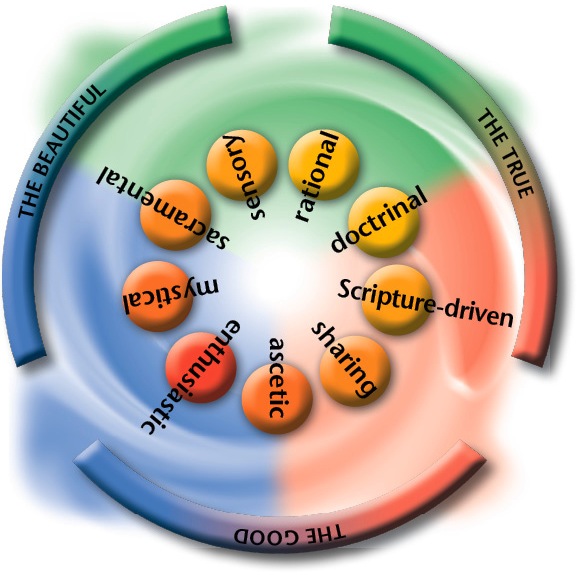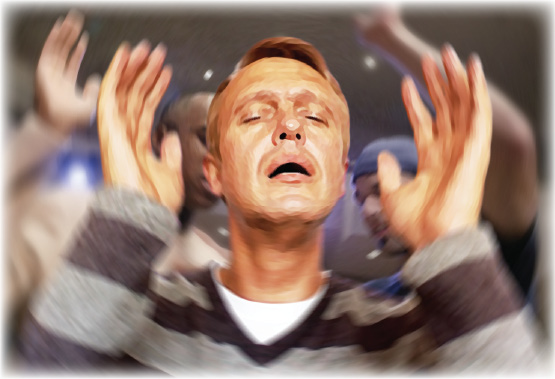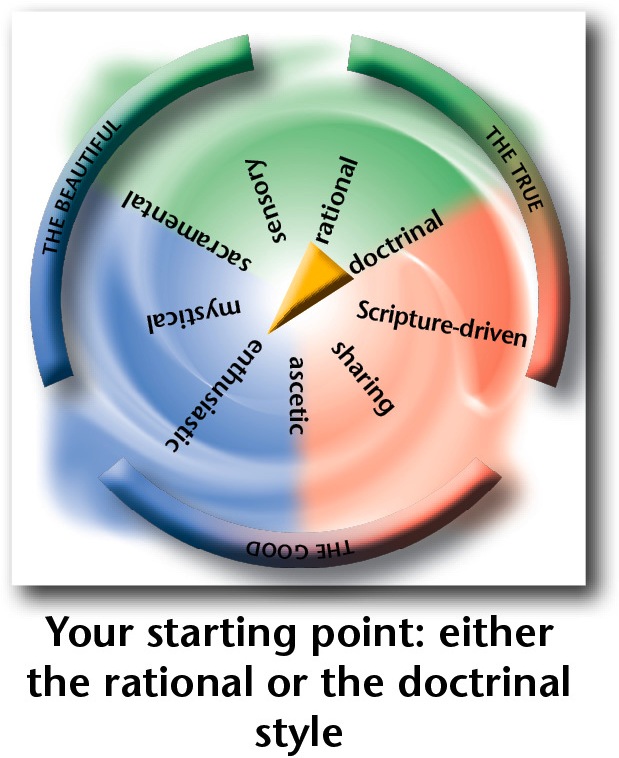What fascinates me about my enthusiastic mentor Olli
O
lli experiences the supernatural dimension of faith so much as a normal part of his everyday life, that I would perfectly understand if he dismissed someone like me as a “hopeless rationalist.” But he doesn‘t do that. Of course, sometimes I can sense a bit of good-natured teasing against “you intellectuals” (putting me far more into the rationalist corner than is really fitting), but I sense, throughout our communication, his honest openness, even eagerness, to learn from someone like me. When speaking to him, he doesn‘t react with the smile of the spiritually superior, but he begins to think, to question himself. Olli has not the slightest intention of stepping away from his enthusiastic style one bit. But he constantly hungers to learn more—even from me. And I learn new things in every encounter with him. That’s what makes our relationship so exciting, so honest, and so challenging.
 Graphical representation of the enthusiastic style: It is essential to understand the positioning of this style within the Trinitarian Compass. Christians with an enthusiastic style should take into special consideration the two opposite styles (rational and doctrinal) as these throw light on the dark side of the enthusiastic style.
Graphical representation of the enthusiastic style: It is essential to understand the positioning of this style within the Trinitarian Compass. Christians with an enthusiastic style should take into special consideration the two opposite styles (rational and doctrinal) as these throw light on the dark side of the enthusiastic style.
On the one hand, the enthusiastic style belongs to the blue style family; on the other hand, to the ethical style family. Depending on its leaning toward one of its two neighbor styles, it can manifest itself in a more ascetic or mystical variety. For Christians with an enthusiastic style, it is most natural to experience God through encounters with the supernatural. The strength of this style is its trust in God‘s power; the peril is an exaggerated view of human feelings (emotionalism).
 Christians with an enthusiastic style love to seek God in the midst of other enthusiastic believers. The focal point is the expectation that they will experience God‘s supernatural power.
Christians with an enthusiastic style love to seek God in the midst of other enthusiastic believers. The focal point is the expectation that they will experience God‘s supernatural power.
To those approaching the enthusiastic style from the opposite side
 If you display either the rational or the doctrinal style, it is not unlikely that you struggle to imagine learning from the enthusiastic style. Perhaps you have had encounters with people from this style, or you have heard stories about people from their “camp,” and these experiences have been so unpleasant that you have firmly decided how you must evaluate this wing of Christianity. Maybe you consider Christians with this style to be “heretical,” or maybe your view is a little bit more moderate: “They can live emotionally if that suits them, but it definitely isn’t for me.”
If you display either the rational or the doctrinal style, it is not unlikely that you struggle to imagine learning from the enthusiastic style. Perhaps you have had encounters with people from this style, or you have heard stories about people from their “camp,” and these experiences have been so unpleasant that you have firmly decided how you must evaluate this wing of Christianity. Maybe you consider Christians with this style to be “heretical,” or maybe your view is a little bit more moderate: “They can live emotionally if that suits them, but it definitely isn’t for me.”
When I strongly encourage you to interact with the enthusiastic style (in the same way as I encourage Christians with the enthusiastic style to learn from you), I am fully aware of this tendency to skepticism. And your critical point of view is not without reason. The danger of the enthusiastic style is definitely a prevalence of the subjective, the emotional, and the spectacular, which can lead to very questionable results.
On the other hand, the lapses mentioned are not a real danger for you as a representative of the rational or doctrinal style. Your own style has made you relatively immune to these perils. That is great, because on the basis of a solid, biblical foundation, you really can afford to soberly evaluate the strengths of the enthusiastic style, without the threat of being absorbed by its dangers. You have developed the ability to discriminate in spiritual matters, haven‘t you? You are familiar with Paul‘s admonition, “Test everything. Hold on to what is good” (1 Thess. 5:21). If so, you should be able to apply this principle to the enthusiastic style, for if such discrimination can be expected of anyone, most certainly it can be expected of you..
What are the perils of your style? Certainly not emotional excess. In that area you really have no cause for concern. Your potential danger is rather to neglect personal spiritual experiences and the trans-rational dimension. It probably looks neither attractive nor fitting to you to express your spirituality in the same way as Christians with the enthusiastic style. But this is not what I want to encourage you to do. We are not speaking about taking over a “whole package.” Rather, your concern should be to integrate into your own spirituality those aspects of the enthusiastic style that shed light on your own shadows. Or do you honestly believe that your own spiritual style is devoid of shadows? They do exist, and encountering enthusiastic Christians can help you come to grips with those aspects of yourself that may hinder spiritual growth.
Further topics in the above chapter of the full version of the book
Olli, my mentor for the enthusiastic style - How natural is supernatural? - Noise is allowed - Different interpretations - All kinds of people - The core of the enthusiastic style: A God who acts - The two wings of the enthusiastic style - The strengths of the enthusiastic style - The perils of the enthusiastic style

